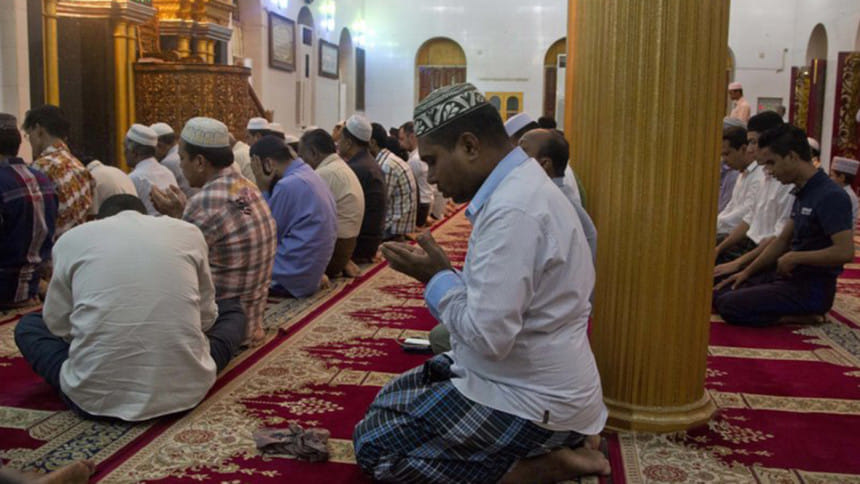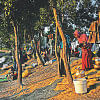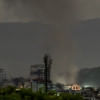‘I feel trapped’: Violence fuels fear among Myanmar Muslims

For four straight days last month, Rahim Muddinn watched, amazed, as Myanmar’s state-run newspapers published special supplements showing Rohingya Muslims accused of being terrorists — nearly 250 photos each day.
For the 41-year-old Rohingya man, it was a surreal moment. He was born and raised in Yangon, Myanmar’s biggest city and far from the western state of Rakhine, where bloody military operations that followed Rohingya militant attacks in August have driven nearly 700,000 Rohingya into refugee camps in Bangladesh.
“When we first saw those pictures, we started laughing. We wondered: When will it be our turn to have our pictures in the paper?” Muddinn, a teacher, said in an interview in his Yangon home.
Behind the laughter, though, there is genuine fear.
The pictures are the latest in a series of chilling realizations for the Rohingya minority here. Though Yangon’s tree-lined boulevards and weathered colonial architecture seem a world away from the rice paddies and isolated villages of Rakhine — let alone the tarp-walled huts of the teeming refugee camps — the government is increasingly linking Rohingya across the country with what it calls a terrorist threat, Muddinn and others say.
Rohingya in Yangon describe a sense of rising persecution and hatred, of vanishing freedoms and opportunities, of Buddhist neighbors and friends suddenly more willing to publicly express sympathies with the military’s destruction of Rohingya villages in Rakhine.
“One day it really could be my picture in the paper,” said Muddinn. Like most of the other Rohingya who spoke with The Associated Press, he used his Rohingya name because of safety worries. “I do have anxiety. The government can detain anyone it says is a supporter of terrorism or anyone viewed as a threat to the state.”
Though Rohingya have always been persecuted in the country, it got much worse after 2012, when violence in Rakhine killed hundreds and drove about 140,000 people, most of them Rohingya, from their homes to camps. Violence flared again in 2016 and, most dramatically, following the August attacks, when refugees report widespread killing and rape by Myanmar forces. The AP last month confirmed, through extensive interviews with survivors and time-stamped video, a massacre and at least five mass graves, all previously unreported, in the Rakhine village of Gu Dar Pyin.
Many Rohingya have been in Myanmar for generations, but, increasingly, the government and media have played up their claim that they’re not citizens but “illegal Bengali interlopers” who entered Myanmar from Bangladesh with the help of corrupt immigration officers.
There are non-Rohingya Muslims in Myanmar, and they often report rising discrimination, especially those in Rakhine. But generally their situation is less precarious than the Rohingya.
Myanmar’s government denies discriminating against Rohingya and other Muslims.
“It’s totally not true that Muslims in the cities like Yangon have no freedom of movement or lack the same rights as other populations,” said Aung San Win, director general of Myanmar’s Ministry of Religion. “Everyone is granted rights to freedom by the constitution, including Muslims. There is no discrimination in the country.”
In Yangon, however, hate speech against Rohingya has risen, and Buddhists who were once friends and colleagues now shun Muddinn’s family. Muddinn believes the government is now trying to portray all Rohingya as terrorists.
When he hears a motorcycle rev its engines near his home after midnight, he wonders if a policeman is coming to detain him. His wife, Amina, hasn’t left their home by herself since 2012 because of shame and fear after a Buddhist spit on her.
Why did it happen? Because she was wearing a burqa.
Kyaw Min, a Rohingya activist
Not far away, Kyaw Min, a well-known Rohingya activist and president of the Democracy and Human Rights Party, brandishes the newspaper photos of alleged terrorists.
The government, he said in his party headquarters, is trying to make it so that nearly every Rohingya family in Rakhine state will be associated with an accused terrorist if the refugees in Bangladesh ever return to Myanmar.
Safety is a worry even in Yangon. He said he no longer leaves his home at night or travels alone around the city. Some party members have been attacked, and he has suffered intense abuse on social media, with people calling him “rubbish” and an “interloper from Bangladesh.”
Early last year, a gunman killed Ko Ni, a prominent member of Myanmar’s Muslim minority and a legal adviser for the ruling National League for Democracy party. He was shot in the head at the Yangon airport.
Ko Ni, who wasn’t Rohingya, had criticized the NLD in 2015 for not putting up Muslim candidates in the general election.
Since August, abuse has intensified, and Rohingya leaders risk their safety if they speak out publicly. “We feel this everywhere,” said Kyaw Min, who spent years in prison on what he calls politically motivated charges.
Though most Rohingya worry less about their political future and more about putting food on their plates, the sense of discrimination and persecution is a heavy burden. All of them, says Kyaw Min, “will have some sort of scar in their hearts.”
The story of Ajas, a student in Yangon
“The word ‘Rohingya’ is a dangerous thing to be called in this country,” said Ajas, 26, a college student in Yangon, who, like some other Rohingya, uses only a single name. “The government has brainwashed the whole country into thinking that we are illegal immigrants.”
Few local NGOs or Buddhist activists will stand up for the Rohingya, but Ajas said he and others are trying to talk with liberal Buddhists and other “moderate minds.”
Still, he is the only Rohingya in his class and sometimes has problems with Buddhists when he describes himself as Rohingya. “They don’t accept that word because they say there is no such thing as that concept in this country.”
Like many Rohingya in Yangon, Mohammad Warris, another college student, usually keeps his national ID card in a safe at home. The cards, which are used to apply for school, to set up bank accounts and to get passports, are irreplaceable without a huge bribe, he said, because Myanmar has long tried to take them from Rohingya as a way to more easily strip them of citizenship.
“If I didn’t have this, I wouldn’t be able to survive. I could be caught by the police and jailed as a ‘Bengali terrorist,’” Warris, 24, said.
“They are hated by the mass of Burmese because they simply exist,” a 20-year-old student at the University of Yangon says of the Rohingya during an interview in an empty classroom, ceiling fans whirring overhead.
Though the student, who spoke on condition of anonymity because of safety worries, is a rare example of a Buddhist at the school willing to regularly defend the Rohingya, he won’t do it on the streets.
“It’s too precarious,” he said. “If I say ‘genocide’ in public, the government would put me in jail for years.”
Buddhists at the university have accused the student, whose parents are Buddhists from Rakhine, of having Rohingya blood and of taking money from foreign governments and NGOs. A nationalist friend told him he had informed on him to police for insulting Myanmar leader Aung San Suu Kyi and said he would be sued. “He said, ‘You’re destroying your own country by sympathizing with terrorists.’”
He still speaks up in class to defend the Rohingya, but he doesn’t describe himself as an activist anymore and has focused lately on his studies. “I can do better work (for the Rohingya) as a researcher than if I was in jail.”
Neighbourhood in turmoil
One day last year, Muddinn sat with some friends sipping tea at a cafe in his neighborhood when the Buddhist driver of a bicycle rickshaw smashed purposely into the side of a car driven by a Muslim man. It was not the first time the neighbors had seen this Buddhist slam into Muslim cars.
The Buddhist got off his bicycle, screaming insults at the Muslim and trying to punch him.
“I was really furious,” Muddinn said. But he did nothing, even though he describes himself as short-tempered. “Even if we’re the victims,” he said, “the police will see us as the perpetrators because we’re Muslim.”
“I feel trapped,” Muddinn said. “There is no guarantee for our future. I want to stay in this country forever, but now my faith is shaken and I wonder if I will have to move away.”

 For all latest news, follow The Daily Star's Google News channel.
For all latest news, follow The Daily Star's Google News channel. 








Comments